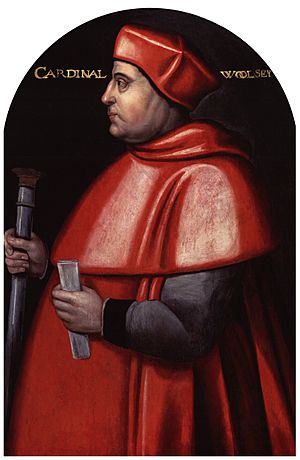Amicable Grant facts for kids
The Amicable Grant was a special tax ordered in England in 1525. It was created by Thomas Wolsey, who was the King's top advisor and a very powerful man. This "grant" was actually a forced loan. People had to pay between one-sixth and one-tenth of their belongings. Church leaders had to pay even more, about one-third of their wealth.
This tax was not approved by Parliament, which was the law-making body. This made the tax illegal and very unpopular. People were already struggling financially. They did not want to pay for King Henry VIII's wars in France. Many people refused to pay, and some even threatened to fight back. Because of this, very little money was collected. The King had to give up on the tax and make peace with France.
Contents
Why the Grant Was Needed
King Henry's War Plans
King Henry VIII really wanted to control land in France. He had already fought wars there between 1511 and 1514. These wars cost a huge amount of money, about £650,000. This was a massive blow to his treasury, which is like the government's bank account.
In 1525, Henry saw another chance to invade France. The French King, Francis I, had been captured by Emperor Charles V at the Battle of Pavia. Henry thought this was a perfect time to take over French land, and maybe even become King of France!
No Money for War
However, Henry did not have enough money for such a big invasion. He needed an extra £800,000 very quickly. So, Wolsey came up with the Amicable Grant to get the money.
Parliament was not likely to support another war. The previous wars in France in 1522 and 1523 had been very expensive. People were tired of paying for them.
What Happened Because of the Grant
Immediate Problems
People were already very poor. They had been forced to give "loans" in 1522 and 1523 that were never paid back. Also, another tax from 1523 was still being collected. Unlike the old "loans," the Amicable Grant offered no promise of repayment.
Church leaders also complained. The Archbishop of Canterbury said that clergy in Kent were "not inclined to the grant." In Ely, they said they would sell their goods, but "no man in the country has money to buy or lend."
Widespread Anger
People across England became very angry. In places like Essex, Kent, Norfolk, and Suffolk, people either refused to pay or were very slow to do so. In Suffolk, wealthy cloth makers paid the tax. But this meant they had to send their workers home because they couldn't afford to pay them anymore.
This led to a big rebellion in Suffolk. About 10,000 men gathered in the town of Lavenham. They planned to start a full uprising. But loyal townsmen removed the clappers from the church bells. These bells were supposed to signal the start of the revolt.
The Grant Is Dropped
The Dukes of Norfolk and Suffolk eventually stopped the rebellion. But the rebels had made their point clear. King Henry first cut the tax in half. Then he decided to cancel it completely. The government also had to lower the payments for the 1523 tax to calm people down.
The leaders of the rebellion were brought before a special court. But they were pardoned, meaning they were forgiven. Wolsey even put on a show of asking the King to pardon them. He also gave them money to help them out.
This "benevolence" tax could only have worked if people gave money willingly. It never would have raised enough money for a French invasion.
Long-Term Impact
Wolsey's failure with the Amicable Grant was a big embarrassment for him. It was the first time he had truly failed to do what Henry wanted. This event may have led to Wolsey losing his power in 1529. King Henry even pretended he knew nothing about the tax. He blamed Wolsey entirely.
The people's anger also changed England's foreign policy. The government realized it couldn't raise money so quickly through taxes. Henry had to give up his plans in Europe. England made peace with France. There were no major wars for England until 1542.
The Amicable Grant showed that the government had pushed too hard with taxes. The fact that they changed and then stopped the tax showed that the Tudor government could be flexible. They listened when people were upset. This event, and other tax revolts, likely taught King Henry and future Tudor rulers how to handle taxes better. Tax revolts became much less common after this period.
 | James Van Der Zee |
 | Alma Thomas |
 | Ellis Wilson |
 | Margaret Taylor-Burroughs |


